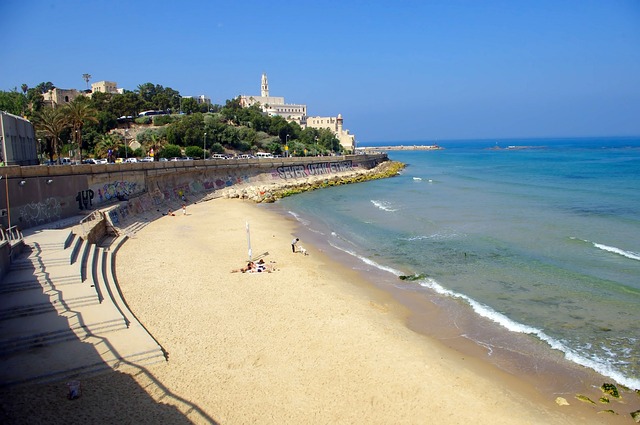Last Updated on November 7, 2021
The weather and climate in Israel.
Hebrew: אקלים ומזג האוויר בישראל

Israel weather has a typical Mediterranean climate with hot dry summers from mid-May to mid-September. Israel has cold and rainy winters. Light isolated showers, together with moderate and comfortable temperatures, can be expected in October. November can be cold and during December and January, one can expect consecutive rainy days. Snow in the mountainous northern regions of Israel are and in Jerusalem are not unusual. April is spring. Spring and autumn are short. The peak summer season, June – August, brings high temperatures with no rainfall. You can expect sunshine in Israel for about 8-9 months in the year.
Sunrise in Israel can be as early as 5:00am in the mid summer and around 6:30am in mid winter. Sunset in the summer can be as late as 8:00pm and in the winter, it will be dark at around 5:00pm.
Israel Weather Properties
Rainfall
Rainfall varies considerably in the northern and southern parts of the country. Almost no rain falls in Eilat, while Nahariya and Rosh Hanikra in the far north and Jerusalem, in the center, have the most rainfall in the country.
Snow
Snow falls regularly in Jerusalem and the high peaks of the Hermon in the Golan – the northern most part of the country. Snow in the Golan will stay on the ground for the entire winter. The melting snow in the Golan flows down the Dan River system into the Kinneret (Sea of Galilee) and then small tributaries take it down to the Dead Sea. Haifa may, on a rare occasion have a light snow storm at night. The snow usually melts by morning
Hail & Thunder
You can expect lightening and thunderstorms in the winter. Hail storms are not uncommon, and sometimes heavy hail, mistaken by small children as snow, carpets the ground.
Sea Temperature
The Mediterranean coastal sea temperatures are as low as 15 Centigrade and can reach 30 Centigrade in the mid-summer.
The Dead Sea and Eilat, on the Red Sea have similar sea temperatures which vary between 20 and 30 in the winter and summer months.
The Sea of Galilee (Kinneret) has sea temperatures of between 15 and 30 degrees in the winter and summer
Humidity
Israel is hot and humid. Summer temperatures can reach up to between 30 – 38 Centigrade, and sometimes more. Humidity can vary between 20% in the southern most parts, around Eilat, to about 85% in the Rosh Hanikra region.
Heat Waves
Israel has approximately 50 days in the year when heatwaves prevail. The specific conditions that accompany these heatwaves; dust storms and light rains are referred to as a ‘Sharav’ in Hebrew or ‘Hamsin’ in Arabic.
Average Centigrade Temperatures in Israel
| Cities | Jan | Feb | Mar | Apr | May | Jun | Jul | Aug | Sep | Oct | Nov | Dec |
|---|---|---|---|---|---|---|---|---|---|---|---|---|
| Jerusalem | 6-11 |
7-14 |
8-16 |
12-21 |
15-25 |
17-27 |
19-29 |
19-29 |
18-28 |
16-26 |
12-19 |
8-14 |
| Tel Aviv Netanya Herzliya | 9-18 |
9-19 |
10-20 |
12-22 |
17-25 |
19-28 |
21-30 |
22-30 |
20-31 |
15-28 |
12-25 |
9-19 |
| Haifa | 8-17 |
9-18 |
8-21 |
13-26 |
15-25 |
18-28 |
20-30 |
21-30 |
20-30 |
16-27 | 13-23 |
9-18 |
| Tiberias | 9-18 |
9-20 |
11-22 |
13-27 |
17-32 |
20-35 |
23-37 |
24-37 |
22-35 |
19-32 |
15-26 |
11-20 |
| Eilat | 10-21 |
11-23 |
13-26 |
17-31 |
21-35 |
24-37 |
25-40 |
26-40 |
24-36 |
20-33 |
16-28 |
11-23 |
| Dead Sea | 11-20 |
13-22 |
16-25 |
20-29 |
24-34 |
27-37 |
28-38 |
29-38 |
27-36 |
24-32 |
18-26 |
13-21 |
Learning Hebrew
- Learn Hebrew ‘weather’ words with English and transliterations
- More Hebrew words & phrases, by topic…
Did you know?
In June 1942, Kibbutz Tirat Tzvi in the Beit She’an Valley, which lies 722 feet below sea level, recorded the highest temperature ever officially measured in Asia: 129º Fahrenheit or 53.88º Celsius
Find out more…
- Everything you want to know about Israel’s people and culture
- Places of interest & attractions in Israel
- Jewish holidays and festivals in Israel


